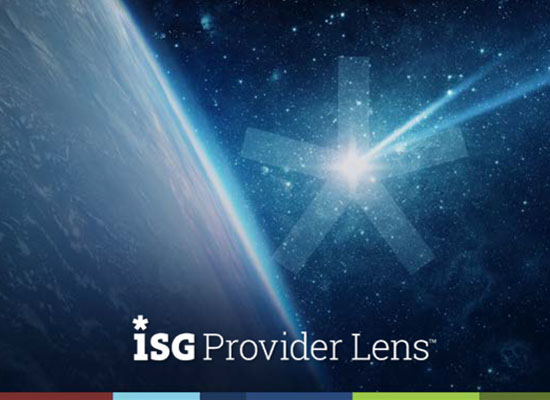

mLogica's approach to Eliminating Obsolescence while Modernizing High-performance Mainframe Platforms

ISG Star of Excellence Briefing Notes - September 2024
Introduction
mLogica uses proven technology to assess legacy applications and automatically translate them to the most recent languages and databases, eliminating the obsolescence of applications running on mainframes or cloud environments. ISG assessed six case studies to identify the benefits of using mLogica’s solutions.
Client Story Summary
| Clients | A financial service company, two insurance companies, one telecommunications company and one public sector/government agency. |
| Industries | Banking, financial services and insurance (BFSI), telecommunications and public sector. |
| Region | Europe and the U.S. |
| Client Objective | Use automated AI-powered technologies to replace QUICKJOB, Assembler, CA Easytrieve, CA Telon, PL/1, Visual Age Generator (VAGen) and Cross Platform System (CSP), JCL scripts, IMS and IDMS. |
| Solutions | mLogica developed automated software reengineering tools to modernize databases and applications. Its toolset is centered around LIBER*M Mainframe Modernization Suite and STAR*M for distributed database migrations. |
| Benefits Achieved | Reduce the risk of obsolescence related to discontinued vendor support, gain the agility to maintain applications and integrate innovations, eliminate software licensing costs related to languages and middleware, and easily access IT skills for application development and support. |
Client Background
Case 1: An insurance company, with over $10 billion in assets and nearly 30,000 brokers, agents and associates, was running legacy applications on an IBM mainframe. The environment included QUICKJOB reporting tool, including 159 QUICKJOB programs with over 32,700 lines of code (LOC) that needed to be converted to Micro Focus COBOL. The project aimed to gain cost efficiencies and enable the use of modern COBOL functionalities.
Case 2: An insurance company with more than 4,000 employees and over 2.7 million retail customers had many business applications accessing data stored in IMS. The Information Management System (IMS DB), a product launched by IBM in 1968, utilizes a hierarchical database model. To access data, new applications needed to be integrated with a COBOL application to interface with the IMS DB, reducing the overall query performance. Converting the old database to a modern relational database management system (RDBMS) would require moving a high volume of sensitive information that is subject to stringent governmental regulations pertaining to financial data and transactions. The client was facing increasing operational and licensing costs. The insurance company sought to move to a cloud-based RDBMS to enhance business agility and improve CX.
Case 3: A financial service provider specializing in consumer credit, including leasing, credit cards and loans, was experiencing recurring challenges related to CA Easytrieve routines and Job Control Language (JCL) scripting. To eliminate dependency on these tools, the financial service company had to convert 486 Easytrieve routines and 456 JCL scripts to COBOL while ensuring the performance and operational integrity of its critical business applications.
Case 4: A multinational beverage corporation with more than $33 billion in annual revenue, multiple international subsidiaries and approximately 80,000 employees was using the IBM z/OS platform to run business-critical applications. The company desired to migrate from IBM z/OS to a Linux platform on the AWS cloud. The project scope included IBM batch processing; IBM CICS; IBM Db2 with 325 tables; IMS DB with 106 database descriptions and 800 segments; CA7 and CA11 scheduler and batch job restart; 1,002 COBOL programs; 5,800 JCL batch jobs; 355 PL/1 programs; and 324 Easytrieve programs. The beverage company’s goal was to use state-of-the-art cloud-native technologies to meet current and future business and regulatory requirements.
Case 5: A European telecommunications company serving millions of customers in Europe, Asia and the Americas needed a partner with in-depth expertise in converting Assembler to a Micro Focus COBOL platform. The project scope included approximately 610,000 LOC, 416 programs, 39 macros and 456 copies.
Case 6: A government organization with over 45,000 employees that provides financial aid and assistance to unemployed citizens and facilitates their job placement had a complex applications environment, comprising COBOL, IBM VisualAge Pacbase, Assembler CICS, JCL, Db2, IMS DB, VSAM, Tivoli Workload Scheduler (TWS), Operations Planning & Control (OPC), Cortex (Job scheduler), EGEN CA and SYSVIEW. The company wanted to run its applications on an open platform. The clients requested mLogica to convert all applications to COBOL to run on a Linux-based environment with the LIBER*Z emulation toolset.
mLogica Solution Highlights
mLogica provided ISG with a detailed briefing regarding its products and GenAI automation. The case studies presented demonstrate the company’s ability to address complex requirements for converting many legacy languages, especially Easytrieve and Assembler. Its LIBER*M Mainframe Modernization Suite has many modules and products that address various technologies used in IBM z/OS and GCOS8 (BULL) mainframes and enable repurposing, refactoring, replatforming and rearchitecting. Clients use LIBER*M to standardize COBOL applications and eliminate costly subsystems and middleware when operating on the mainframe or Linux platforms (on-premises or cloud). Additionally, they leverage LIBER*M to convert COBOL to Java or C# to run natively in the cloud. This suite includes solutions to transform databases, schedulers, job scripting and compilers.
Every project begins with a detailed assessment, which is mandatory for successful migration projects. It is critical for mLogica to understand clients’ operating environment and intended goals to design a safe modernization path. The company uses automated discovery with LIBER*DAHLIA to identify applications, interdependencies, data storage and databases.
LIBER*TULIP is an application refactoring automated tool that accurately converts QUICKJOB programs into functional-equivalent Micro Focus COBOL code. QUICKJOB is a niche legacy reporting utility that no other vendor can convert automatically. Initial LIBER*TULIP iterations generated 90 percent refactoring accuracy rates, and further customization enabled 95 percent accuracy, substantially reducing the need for costly manual intervention and errors.
LIBER*IRIS can automatically migrate IMS DB data structure and data to MS SQL or any RDMS. With LIBER*IRIS, mLogica migrated a client’s IBM IMS database to MS SQL on AWS EC2 and executed the existing COBOL to access the new MS SQL database, providing a safe transition without impacting end users. In addition, mLogica offered comprehensive support to ensure the new environment met agreedupon performance SLAs.
To convert Easytrieve and JCL scripts, mLogica used the automated LIBER*DAHLIA module to analyze programs and their dependencies and design a code conversion and migration plan. It itemized the programs and interdependencies to classify each one as migration-ready, duplicate or obsolete and schedule tasks accordingly. LIBER*TULIP module was used to convert all programs while eliminating duplications and obsolescence.
For a beverage company’s complex environment, all programming languages were automatically refactored and consequently consolidated to Dell Enterprise COBOL. The source databases were consolidated from IMS DB and IBM Db2 to IBM Db2 LUW, following modifications in database structure to transform a hierarchical database into a relational database. The migration included infrastructure and interfaces. The CA-7 scheduler was migrated to the IBM Tivoli Workload Scheduler. The mainframe security from ACF2 was migrated to DELL TSF. DFSORT was migrated to Syncsort. Other key adaptations included MQSeries, print management and data file migration such as VSAM, GDG and sequential files.
In all cases, mLogica provided comprehensive automated testing to ensure the applications adhered to the specific requirements and exhibited identical behavior. During testing, mLogica’s team analyzed test findings, issues and patterns and accelerated root cause analysis. mLogica adjusted or customized its automation tools to create new code that was free from issues. The company’s quality assurance included unit testing (UT) and system integration testing (SIT) to validate applications’ performance and assess their adherence to user requirements.
Outcomes
By leveraging AI and ML, mLogica’s LIBER*M Mainframe Migration Suite accelerates mainframe modernizations while providing high-quality outcomes. In one of the client cases, the LIBER*TULIP module accurately converted, tested and migrated over 150 QUICKJOB programs to Micro Focus COBOL within tight deadlines, enabling the client to save a substantial amount on license renewal costs.
Converting old data files and databases to RDMS allowed the client to seamlessly integrate modern technologies on an ongoing basis. In addition to modernization, the client opted to run its RDMS on AWS EC2, reducing operational costs and incorporating advanced security features to monitor data access in compliance with new requirements.
While the case studies demonstrate the substantial cost-effectiveness of public cloud solutions compared to legacy, on-premises mainframes, many clients remain apprehensive about potential performance and security implications. In the case studies provided by mLogica, the AWS cloud met current and future client requirements, including guaranteed business continuity, high reliability, unlimited scalability and capacity. The cloud also provided a more comprehensive disaster recovery and security protection scope. The clients reported the AWS cloud system was significantly more cost-efficient and reliable than their previous IBM z/OS mainframe.
In all cases, consolidating programming languages, databases and data types created a streamlined system and amplified the access to skilled experts. On the user side, mLogica’s approach to automation and quality assurance mitigated any impacts on the user, eliminating the need for training and organizational change management.
Client Testimonial
"What the mLogica team accomplished was extraordinary. With the previous vendor, our mainframe modernization was completely stalled due to an overlooked QUICKJOB reporting tool. Without a fast resolution, we faced millions in license renewal fees to avoid business disruption. mLogica quickly re-tooled their technology to clear this logjam in time, and they provided comprehensive user support during and after migration, ensuring business continuity."
– Director, Information Technology
Analyst Comments
mLogica provides a unique solution to convert Easytrieve and Assembler, which are commonly found in legacy mainframe environments and difficult to refactor or rewrite. The company offers a pragmatic approach to modernization and demonstrates in-depth knowledge, with over 20 years of modernization experience. It has successfully delivered more than 600 large-scale engagements, including distributed systems and over 74 complex mainframe migrations. Its proven track record of processing more than 248 million lines of code and refactoring over 377,000 applications underscores its expertise.
The company supports clients in laying the ground for future growth by eliminating obsolescence and freeing them from outdated programming tools and databases. Modernization eliminates vendor lock-in and can substantially reduce licensing costs.
mLogica provides smooth transformations and transitions to a modernized IT landscape, tailored to every client’s needs without disrupting their existing work processes. The company resolves complexity with automation and GenAI, delivering a comprehensive range of refactoring and replatforming solutions that include data model modification, data migration, and infrastructure and interface adaptation.
ISG Assessment of mLogica
ISG Provider LensTM positioning: mLogica was recognized as a Leader in the Mainframe Modernization Software quadrant of the 2024 Mainframe Modernization study. Readers can find details in the following link:
About the Author
Pedro L. Bicudo Maschio
Distinguished analyst and author –
Principal Consultant
Pedro.Maschio@isg-one.com

Pedro L. Bicudo Maschio brings extensive experience in the research of theBrazilian and Global services’ market. With more than 30 years of experience,he is highly skilled at analyzing market positioning, vendor contracts, pricing models, vendor staffing and delivery cost structure for improving market competitiveness.Pedro has experience in both client and vendor roles. As a research author,he is well positioned to assess and report on the state of the industry andmake recommendations for both enterprises and service provider clients.
About ISG (Information Services Group)
ISG (Information Services Group) (Nasdaq: III) is a leading global technology research and advisory firm. A trusted business partner to more than 900 clients, including more than 75 of the top 100 enterprises in the world, ISG is committed to helping corporations, public sector organizations, and service and technology providers achieve operational excellence and faster growth. The firm specializes in digital transformation services, including AI and automation, cloud and data analytics; sourcing advisory; managed governance and risk services; network carrier services; strategy and operations design; change management; market intelligence and technology research and analysis. Founded in 2006, and based in Stamford, Conn., ISG employs 1,600 digital-ready professionals operating in more than 20 countries—a global team known for its innovative thinking, market influence, deep industry and technology expertise, and world-class research and analytical capabilities based on the industry’s most comprehensive marketplace data.
For more information, visit www.isg-one.com.
About ISG Research™
ISG Research™ provides proprietary research, advisory consulting and executive event services focused on market trends and disruptive technologies driving change in business computing. ISG Research™ gives business and technology leaders the insight and guidance they need to accelerate growth and create more value..
© 2024 Information Services Group, Inc. All rights reserved. Reproduction of this publication in any form without prior permission is strictly prohibited. Information contained in this report is based on the best available and reliable resources. Opinions expressed in this report reflect ISG’s judgment at the time of this report and are subject to change without notice. ISG has no liability for omissions, errors or completeness of information in this report. ISG Research™ is a trademarks of Information Services Group, In.
For more information, please email contact@isg-one.com.
call +1.203.454.3900, or visit research.isg-one.com.








































